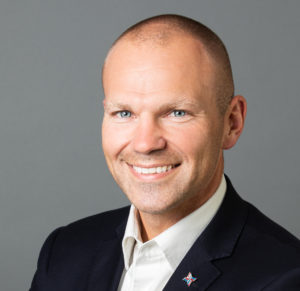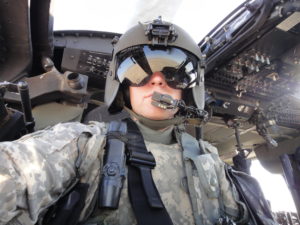Safety is a priority for many engineering-driven organizations. For global helicopter operator Bristow, it’s not only top of mind — but also a matter of hearts and hands, says Vice President of Health, Safety, and Environment James Stottlemyer.
The company’s Target Zero program sets ambitious safety goals, backed up by action and accountability. In March, Bristow became the first helicopter operator in the United Kingdom to achieve a new international safety standard.

Stottlemyer talks about Bristow’s approach, how his military service and family shape his commitment and successfully merging safety cultures when Bristow combined with another company last year.
Safety touches so many aspects of a company like Bristow – your people, your operations, and your work providing search and rescue services. How does your Target Zero commitment define your approach to safety?

Photo courtesy of Bristow.
At Bristow, Target Zero is more than a safety initiative or commitment, it is who we are. It permeates the organization in everything we say and do. Each Bristow employee feels a connection to safety, and everyone owns safety. We share a common belief that our customers, colleagues, and partners have a right to return home safely, in good physical and mental health every day.
Bristow lives our Target Zero culture through our “Heart, Head, and Hands,” or how we feel, think, and act in line with our Target Zero principles. Throughout our working day, we individually demonstrate our commitment to Target Zero through four positive safety actions: Pause and Reflect, Choose Safe Outcomes, Report and Share Lessons, and Stop Work.
Organizationally we remain steadfast in our belief that all accidents and incidents can be prevented. Our Target Zero safety culture is supported by competent and capable safety leaders and a robust safety assurance system to allow for the proactive management of risk. As a founding member of HeliOffshore, Bristow believes that as an industry we are stronger together, and through collaboration with our manufacturers, customers and regulators, we can deliver on significant safety enhancements.
About a year ago, Bristow combined with Era Group. How did you establish a unified safety culture?
I believe that culture is a living, breathing part of an organization that is constantly evolving, one that needs to be continually reinforced with actions and monitored to ensure it remains the positive culture we aspire to create. Own Safety, which was Era’s culture of safety, and Target Zero shared many similarities, but more importantly, both were integrated into the actions, mindsets, and behaviors of the shared workforce. Employees at all levels were committed to delivering safe operations and felt ownership for the management of risk. Our responsibility post-merger was to acknowledge the strengths of both cultures and create a common vision for the combined organization moving forward.
The new company values established following the merger set the foundation for the evolution of Target Zero and the alignment of the two company safety cultures. Travel restrictions and social distancing requirements due to COVID-19 did require that we think outside of the box to launch our updated safety culture. Our launch video was narrated by front-line employees representing every country where we operate and was produced using cell phone footage. Virtual and in-person town halls have continued to serve as a preferred method of two-way engagement between the executive team and our front-line workforce. To continue our safety conversation, we will be rolling out a safety survey later this summer to ensure we are continuing to foster our desired culture and identify opportunities for improvement.
You started your career as a company commander and helicopter maintenance test pilot for the U.S. Army. How does your military service inform your commitment to safety today?

Photo courtesy of Bristow.
We all work safely for different reasons. My personal, “why,” or reason I work safely, has not changed throughout my career but has only been reinforced by my experiences and the opportunities I have been given. My faith and family have continually served as the source of motivation to keep me working safely and drives my decision-making and actions.
I credit my military service with helping me to identify two passions that I potentially would have never discovered: a passion for helping others overcome challenges and a passion for aviation. These are my professional “why.” On my second deployment as a commander, I was asked to lead a unit whose motto was “The Misfits: You don’t want us, till you need us.” Over the next 18 months, my leadership team, comprising some of the best non-commissioned officers I have ever worked with, helped the team achieve progressive small victories – from personal achievements with family relationships, finance or fitness, to professional achievements by completing new and complex tasks and challenging training scenarios. These small “wins” built momentum and excitement allowing for an individual and collective sense of pride. By the time our unit deployed we were no longer the “Misfits” but instead had transformed into the resilient and tenacious “honey badgers” because “honey badgers don’t care,” a motto that reflected our willingness to accept and excel at all tasks. The past year has shown the power and importance of individual and corporate resiliency.
Becoming a maintenance test pilot (MTP) for the U.S. Army, my own personal challenge, served as a capstone to my personal career as a pilot, and I feel was achieved by committing to taking challenges head-on, demanding personal excellence, and not limiting my own potential.
Safety is a priority for many companies, across industries and engineering disciplines. What emerging technologies or best practices do you think will shape the workplace and operational safety in the near term?
From an aviation safety perspective, I am excited to see advancements in aircraft reliability, software, and hardware design focused on minimizing the potential for human error, and technology that can provide an unparalleled level of situational awareness and advanced automation for our crews. Over the next few years, the continued emergence of eVTOL (electric vertical take-off and landing) technology will continue to rapidly transform the aviation space.
We also have a responsibility to be good stewards of the environment and sustainable practices and design should continue to be advanced and adopted within our industry.
The last year has reinforced the importance of mental wellness programs to help employees manage stress in their personal and professional lives that can serve as a source of distraction within the workplace. During this time, significant effort has been placed to better understand what can impact one’s ability to focus on a task and to develop a model that can be adopted to make a significant impact on reducing distraction-related events during safety-critical tasks.
– Melissa Mathews, The Engineering 100
